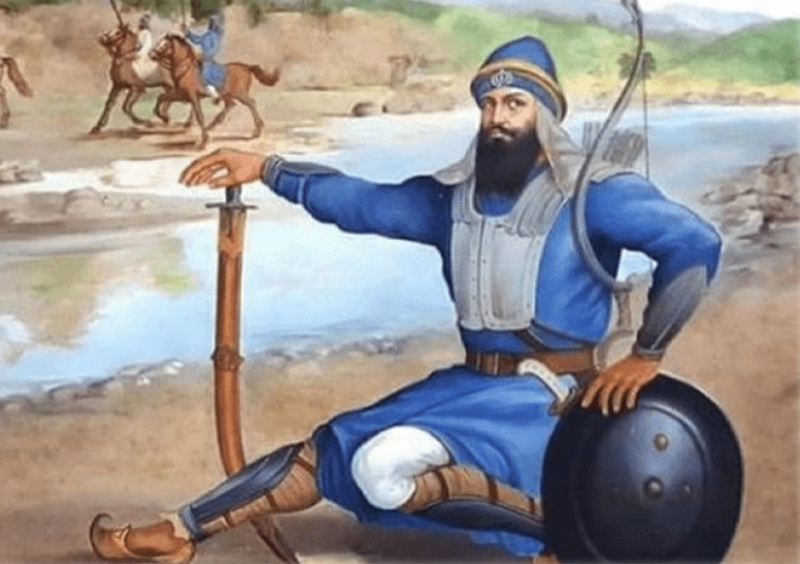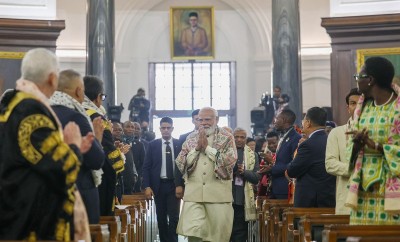 Sikhism
Sikhism
Banda Singh Bahadur: The Dawn of Sikh Empire and a Crusade Against the Mughals
In the annals of the Indian subcontinent, few figures shine as brightly as the charismatic and enigmatic Banda Singh Bahadur.
A warrior, a saint, a revolutionary, he was the man who laid the foundation of the first Sikh empire, defying the colossal Mughal regime, and sowing the seeds of a resistance that would bloom into a lasting legacy.
Born as Lachman Dev in 1670, in the tumultuous period of the Mughal reign, he was originally a Rajput from the Jammu region.
His journey towards becoming Banda Singh Bahadur, the harbinger of Sikh sovereignty, is a fascinating tale of spiritual awakening and political transformation.
After a chance encounter with Guru Gobind Singh, the tenth Sikh Guru, in Nanded, Lachman Dev renounced his ascetic life, embraced Sikhism, and was baptized as Banda Singh Bahadur.
Guru Gobind Singh, witnessing the potential in this newly converted Sikh, entrusted him with the monumental task of leading the Sikh community against the tyrannical Mughal rule. Banda Singh Bahadur, armed with a double-edged sword, five arrows, and a blessing of the Guru, set off to Punjab, setting in motion a sequence of events that would change the course of Indian history.
Banda Singh Bahadur’s military genius shone brightly in the Battle of Samana in 1709, where he led a rag-tag group of Sikhs against the well-equipped Mughal army. Employing guerilla tactics and leveraging the sheer force of their conviction, they emerged victorious, capturing the strategically vital city of Samana. This victory was not just a military achievement but a psychological one – it shattered the myth of Mughal invincibility.
The next significant milestone was the capture of Sirhind, where the two younger sons of Guru Gobind Singh had been brutally executed. The Battle of Sirhind was more than a mere clash of arms for the Sikhs; it was a quest for justice. Under the tenacious leadership of Banda Singh Bahadur, the Sikhs vanquished the Mughals, and Sirhind came under Sikh control in May 1710.
Banda Singh Bahadur’s achievements were not confined to the battlefield. He established the first Sikh administrative system, demonstrating his visionary approach towards governance. He abolished the Zamindari system, a landmark move that transferred the land ownership rights to the tillers, symbolizing a revolutionary step towards social justice and agrarian reform. In an era rife with religious discrimination, he promoted secularism, appointing people of all faiths to key positions in his administration.
However, Banda Singh Bahadur’s crusade against the Mughals was not a smooth sail. He faced significant challenges, the most formidable being the Siege of Gurdas Nangal. Despite being heavily outnumbered and subjected to extreme conditions, Banda Singh Bahadur and his men held their ground for eight long months. Though the fortress ultimately fell, and Banda Singh Bahadur was captured and executed, the spirit of defiance and resilience he embodied lived on.
Banda Singh Bahadur’s life was a symphony of courage, conviction, and rebellion against tyranny. His indomitable spirit served as the bedrock for the establishment of the Sikh Empire under Maharaja Ranjit Singh, decades later. Despite his life being brutally cut short, his legacy has traversed the boundaries of time, inspiring generations to rise against injustice and oppression.
His saga, embellished with heroism and sacrifice, is a testament to the power of the human spirit that resists tyranny and seeks justice. It is a saga that challenged the status quo and dared to envisage a world where power flowed not from the throne of an emperor, but from the hands of the common man. His life story is not just a chapter in the history of Sikhism or India, but a lesson in courage and conviction for all humanity.
The spirit of Banda Singh Bahadur – his unyielding courage, his unwavering commitment to justice, and his unequivocal faith in the cause he fought for – continue to inspire the Sikh community and beyond. His saga serves as a beacon of hope, reminding us that even in the face of overwhelming odds, it is possible to rise, to resist, and to etch an indelible mark on the canvas of history.
Banda Singh Bahadur’s legacy continues to shine, his story continues to be told and retold, resonating with the timeless essence of human resilience and the ceaseless quest for justice. His was a life that truly epitomized the Sikh tenet of “Sarbat da Bhalla” – the welfare of all. It is a legacy that calls out across the centuries, urging us to uphold the principles of equality and justice, to be fearless in the face of oppression, and to carry the flame of courage and conviction in our hearts.
As we delve into the pages of history and trace the life and times of Banda Singh Bahadur, we are left not only with a sense of profound admiration but also a sense of purpose – to imbibe his values, to learn from his indomitable spirit, and to strive for a world that echoes his vision of equality, justice, and freedom. In an age where power and oppression often walk hand in hand, the story of Banda Singh Bahadur remains as relevant as ever – a potent reminder of the power of the individual, the strength of conviction, and the enduring legacy of a truly extraordinary life.
Support Our Journalism
We cannot do without you.. your contribution supports unbiased journalism
IBNS is not driven by any ism- not wokeism, not racism, not skewed secularism, not hyper right-wing or left liberal ideals, nor by any hardline religious beliefs or hyper nationalism. We want to serve you good old objective news, as they are. We do not judge or preach. We let people decide for themselves. We only try to present factual and well-sourced news.







